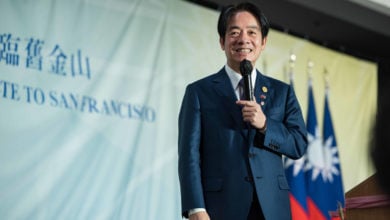The following interview with Brian Becker, national director of the ANSWER Coalition and a founding member of the PSL, was originally published by the Global Times, a widely-read Chinese publication.
Global Times: As the founder of the Party for Socialism and Liberation, what is your take on China’s achievements during the past decade under the leadership of the CPC? What changes in China during this period have impressed you the most?
Becker: Perhaps the most impressive single achievement during the past decade was the eradication of extreme poverty for more than 850 million people. This was the greatest anti-poverty program achievement in the history of the human race. Another unmistakable achievement was the success of managing the COVID crisis. In the US, where I live, more than one million people have died. More than 60 million workers lost their jobs in 2020. More than 100,000 small businesses were sent into bankruptcy. While the US was plunged into an economic recession and a healthcare crisis of unprecedented proportions, the Chinese government pursued a policy preventing such loss of life inside a country with 1.4 billion people. This would have been impossible had it not been for the policy, guidance, and unified approach of the government. That does not mean that there aren’t still significant challenges, but this was a huge achievement. Also, while China has emerged as the 2nd largest economy in the world the leadership of the Party outlined a plan so that economic development was balanced or became more balanced, that efforts to mitigate pollution and climate destruction were affirmed and acted upon and that the goal was to create “common prosperity.” Finally, China offered a different global vision. The development of the Belt and Road Initiative offered a stark contrast to an economic globalization scheme based on neo-colonialism and the exploitation of the nations in the Global South.
GT: What influence does the development of China’s socialism with Chinese characteristics during this past decade have on the global socialist movement?
Becker: In the US and in Latin America today there is a growing revival in the popularity of socialism – especially among tens of millions of young people who want a more just and sustainable world. Growing economic inequality, the danger of climate catastrophe and more war has led millions of young people to seek an alternative to capitalism. China’s development of socialism with Chinese characteristics and its attendant social and economic achievements have naturally become a focus of study for people who are interested in or committed to finding an alternative to the current system with its grotesque inequalities, ever-present violence, endless war and looming climate disaster. The fact that the current leadership of the Chinese Communist Party has reaffirmed and re-emphasized China’s socialist goals has been a source of great inspiration for people who seek a socialist and humanist alternative.
GT: China has been enriching the state and strengthening the army, while adhering to a defensive defense policy. As an anti-war activist, how do you understand China’s security concept? How does it differ from the security concepts of some Western countries?
Becker: The contrast between China and the US on the question of militarism, war, military expansionism, could not be greater. Anyone who analyzes the security orientation of the two countries with an objective lens will easily observe a profound difference. The US leads the most formidable military alliance in the world, NATO. It unites 30 countries into a military bloc. NATO is a US-led military formation. US current military spending is $800 billion which is more than double the combined military spending of the other 29-member states in NATO. China is not a member of any international military formation. The US has more than 800 foreign military bases and installations around the world. The US went to war in Korea, Vietnam, Cambodia, Laos, Grenada, Panama, Iraq, Yugoslavia, Afghanistan, Iraq for a second time, and Libya. In 2018, the US adopted a new military doctrine prioritizing and preparing for major power conflict which obviously has China as the principal target. Following the 2011 so-called Pivot to Asia announcement the US has redeployed more than 60 percent of its air force and naval assets into the Pacific region. Clearly, the US is actually preparing for military confrontation with China. The current effort in “strengthening the army” is clearly a defensive initiative. It would be foolhardy for China to not take the US threat seriously and to upgrade its military capacity in order to defend the country and hopefully to prevent the outbreak of catastrophic global confrontation.
GT: Chinese President Xi Jinping proposed a Global Security Initiative at this year’s Boao Forum for Asia. What do you think about this new initiative? Will it make a notable contribution to establishing a new global order?
Becker: The initiative proposed by President Xi Jinping at the Boao Forum is in essence a reaffirmation of the UN founding charter. What makes the initiative very new and fresh is that it highlights the growing danger of war in the current century as compared to the challenges facing the world at the time of the formation of the UN. It highlights the need for the countries of the world to prioritize and work together to avoid war. It makes the argument that the prevention of war is in the interest of all countries. That there should be a shared commitment to work together in cooperation to avoid and prevent war. The analogy used is that all of the countries in the world are sharing the planet the way people on a large ship have a shared and intertwined, common destiny as regards the fate of the ship rather than looking as if they only care about their cabin on the ship. This makes perfect sense.
GT: You have said that the US is preparing for a war with China and “hoping that China suffers the same fate as the Soviet Union.” Could you elaborate on that? What challenges does the US pose to the security situation in and around China?
Becker: There are two important aspects of this question but they are both very interconnected. The US is obviously planning and preparing for a military confrontation with China. But the goal is not war itself although that could happen. The US goal is to create a process inside of China similar to that which collapsed the Soviet Union. That could only happen if China lost its internal unity. This is the US plan and it’s not really a secret: The US seeks nuclear primacy and military supremacy. The goal of this military buildup, naval and air provocations, the secret sending of military forces to Taiwan is designed to raise the specter of the containment or isolation of China. The real goal of the US is to create so much pressure on China that it will lead to political fractures within China with the hope that the government will lose its existing internal unity. It was the loss of unity inside the Communist Party of the Soviet Union (CPSU) that led to the tragic and completely unnecessary dissolution of the Soviet Union.
US policymakers are operating out of a strategic playbook that is premised on the actual course of events in the 1980s that led to the shocking breakup of the Soviet Union, which – let us remember – was the second largest economy and military power. In the late 1970s and early 1980s the US government embarked on a very aggressive military buildup. The US refused new arms treaties. It placed advanced weapons all around the Soviet Union. The US military budget was nearly doubled. The US launched an effort to gain military supremacy in outer space and end the era of military parity between the two countries. The US consciously created a pressure cooker situation. This created fear inside the USSR that war was coming, and it led to a loss of confidence within the leadership and it aided a political current inside the leadership that sought to appease the US. Failure to properly deal with this aggressive posture and to properly manage political reforms led to the breakup of the unity within the CPSU and ultimately led to a counter-revolutionary overturn. I do not believe this will happen in China. This is an imperial fantasy. China is well aware of this strategy. But the US is playing a dangerous game by escalating toward war and confrontation and extinguishing the different cooperative parts of the US-Chinese relationships that have existed in the previous 40 years.
GT: In the last 10 years, it is evident that China has maintained a relatively stable development momentum, while the US’ strengths have been significantly eroded and the country has faced increasing chaos and internal conflict. In your opinion, what are the reasons behind China’s rise and the US’ decline in development? Will the development gap between the two countries become wider and wider in the future?
Becker: The US spent more than $2 trillion in the war that it lost in Afghanistan since 2001. In that same two decades the US experienced three major economic recessions. Another fundamental weakness for the US government is that the only vision it offers the world is one of absolute US domination. This is unacceptable to the rest of the world. By constantly employing military threats, invading other countries, carrying out targeted assassinations around the world using drone technology, expanding NATO which made war in Ukraine almost certain, by imposing draconian economic sanctions and seizing the assets of smaller countries the US is diminishing its standing in the eyes of the people of the world. This is a serious blow to US “soft power.” China has taken an almost diametrically opposed position by emphasizing peaceful cooperation and what the Chinese call a win-win strategy highlighting that interaction with other countries is considered mutually beneficial rather than a relationship based on coercion. US policymakers continue to act and frame their decisions as if they are living in the 19th century where “might makes right” and a few countries trampled over the rest of the globe. China is also offering a clear-cut, living proof example of how countries in the Global South can achieve economic and social prosperity and overcome the long, dark era of colonization or semi-colonization.






